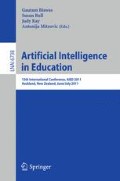Abstract
A teachable-agent arithmetic game is presented and evaluated in terms of student performance, attitude and self-efficacy. An experimental pre-post study design was used, enrolling 153 3rd and 5th grade students in Sweden. The playing group showed significantly larger gains in math performance and self-efficacy beliefs, but not in general attitude towards math, compared to control groups. The contributions in relation to previous work include a novel educational game being evaluated, and an emphasis on self-efficacy in the study as a strong predictor of math achievements.
Access this chapter
Tax calculation will be finalised at checkout
Purchases are for personal use only
Preview
Unable to display preview. Download preview PDF.
References
Rieber, L.P.: Seriously considering play: Designing interactive learning environments based on the blending of microworlds, simulations, and games. Educational Technology Research & Development 44(2), 43–58 (1996)
Schwartz, D.L., Martin, T.: Inventing to Prepare for Learning: the Hidden Efficiency of Original Student Production in Statistics Instruction. Cognition and Instruction 22, 129–184 (2004)
Moreno, R., Mayer, R.E.: Role of guidance, reflection and interactivity in an agent-based multimedia game. Journal of Educational Psychology 97(1), 117–128 (2005)
Vogel, J.F., Vogel, D.S., Cannon-Bowers, J., Bowers, C.A., Muse, K., Wright, M.: Computer gaming and interactive simulations for learning: A meta-analysis. Journal of Educational Computing Research 34(3), 229–243 (2006)
Kebritchi, M., Hirumi, A., Bai, H.: The effects of modern mathematics computer games on mathematics achievement and class motivation. Comp. & Education 55, 427–443 (2010)
Ke, F.: Computer games application within alternative classroom goal structure: cognitive, metacognitive and affective evaluation. Educational Teachnology Research Development 56, 539–556 (2008)
Bos, B.: Virtual math objects with pedagogical, mathematical, and cognitive fidelity. Computers in Human Behavior 25, 521–528 (2009)
Biswas, G., Katzlberger, T., Brandford, J., Schwartz, D.L., TAG-V.: Extending intelligent learning environments with teachable agents to enhance learning. In: Moore, J.D., Redfield, C.L., Johnson, W.L. (eds.) Artificial Intelligence in Education, pp. 389–397 (2001)
Schwartz, D.L., Chase, C., Wagster, J., Okita, S., Roscoe, R., Chin, D., Biswas, G.: Interactive Metacognition: Monitoring and Regulating a Teachable Agent. In: Hacker, D.J., Dunlosky, J., Graesser, A.C. (eds.) Handbook of Metacognition in Education (2009)
McLeod, D.B.: Research on Affect and Mathematics Learning in the JRME: 1970 to the Present. Journal for Research in Mathematics Education 25(6), 637–647 (1994)
Ma, X., Kishor, N.: Attitude Toward Self, Social Factors, and Achievement in Mathematics: A Meta-Analytic Review. Educational Psychology Review 9(2), 2 (1997)
Pajares, F., Graham, L.: Self-Efficacy, Motivation Constructs, and Mathematics Performance of Entering Middle School Students. Contemporary Educational Psychology 24, 124–139 (1999)
Bandura, A.: Self-efficacy: The Foundation of Agency. L. Erlbaum, Mahwah (2000)
Moores, T.T., Chang, J.C.-J., Smith, D.K.: Clarifying the role of self-efficacy and metacognition as predictors of performance: construct development and test. SIGMIS Database 37(2-3), 125–132 (2006)
Frenzel, A.C., Pekrun, R., Goetz, T.: Perceived learning environment and students’ emotional experiences: A multilevel analysis of mathematics classrooms. Learning and Instruction 17, 478–493 (2007)
Ke, F., Grabowski, B.: Gameplaying for maths learning: cooperative or not? British Journal of Educational Technology 38(3), 249–259 (2007)
Sedig, K.: Toward operationalization of ‘flow’ in mathematics Learnware. Computers in Human Behavior 23, 2064–2092 (2007)
Pareto, L., Schwartz, D.L., Svensson, L.: Learning by guiding a teachable agent to play an educational game. In: Proc. of the 14th Int. Conference on Artificial Intelligence in Education, pp. 662–664. IOS press, Amsterdam (2009)
Nilsson, A., Pareto, L.: The Complexity of Integrating Technology Enhanced Learning in Special Math Education – A Case Study. In: Wolpers, M., Kirschner, P.A., Scheffel, M., Lindstaedt, S., Dimitrova, V. (eds.) EC-TEL 2010. LNCS, vol. 6383, pp. 638–643. Springer, Heidelberg (2010)
Mayer, R.E.: Should there Be a Three-Strikes Rule Against Pure Discovery Learning? The Case for Guided Methods of Instruction. Educational Psychologist 59, 14–19 (2004)
Middleton, J.A., Spanias, P.A.: Motivation for Achievement in Mathematics: Findings, Generalizations, and Criticisms of the Research. Journal for Research in Mathematics Education 30(1), 65–88 (1999)
Author information
Authors and Affiliations
Editor information
Editors and Affiliations
Rights and permissions
Copyright information
© 2011 Springer-Verlag Berlin Heidelberg
About this paper
Cite this paper
Pareto, L., Arvemo, T., Dahl, Y., Haake, M., Gulz, A. (2011). A Teachable-Agent Arithmetic Game’s Effects on Mathematics Understanding, Attitude and Self-efficacy. In: Biswas, G., Bull, S., Kay, J., Mitrovic, A. (eds) Artificial Intelligence in Education. AIED 2011. Lecture Notes in Computer Science(), vol 6738. Springer, Berlin, Heidelberg. https://doi.org/10.1007/978-3-642-21869-9_33
Download citation
DOI: https://doi.org/10.1007/978-3-642-21869-9_33
Publisher Name: Springer, Berlin, Heidelberg
Print ISBN: 978-3-642-21868-2
Online ISBN: 978-3-642-21869-9
eBook Packages: Computer ScienceComputer Science (R0)

